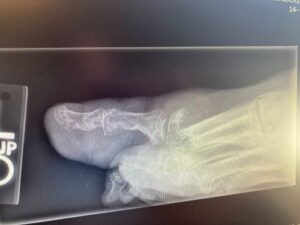Gout is a painful and common health problem that can severely affect the quality of life. Gout occurs when the body makes too many purines, or does not secrete enough purines, leading to an increase in uric acid levels in the blood. When uric acid levels are above normal, gout occurs, causing severe discomfort and potentially serious complications.
As revealed in x-rays, the head of the 1st metatarsal may fracture and displace dorsally in relation to the rest of the 1st metatarsal. In some unfortunate cases, a patient may ultimately need an amputation if the fracture is beyond surgical repair due to extensive bone erosion. However, such a drastic outcome can often be avoided if appropriate measures are taken. For example, if a patient had been taking Allopurinol since the first gout attack, this serious complication would not have occurred. Allopurinol is a medication designed to lower blood levels of uric acid, and by keeping uric acid levels within the normal range, it helps prevent the onset of gout.

Acute Phase of Gout
During the acute phase of gout, a person may wake up with extreme pain, redness, and swelling of a distal joint, making it difficult to walk. If untreated, gout can lead to debilitating long-term effects.
Long-Term Effects of Gout
If gout attacks occur frequently, every 6-12 months, the following long-term effects can develop:
1. Bone Erosion
Erosion of the bone may lead to fractures, as seen on x-rays where the head of the 1st metatarsal can fracture and displace dorsally.
2. Deposition of Tophi
Tophi, a thick white chalky substance, may deposit in and around the joint, leading to chronic pain.
3. Arthritis
Chronic pain may develop due to arthritis and tophi, and in extreme cases, even amputation may be necessary.
Treating Gout with Allopurinol
Allopurinol is a medication that helps lower blood levels of uric acid. If taken since the first gout attack, serious complications like bone erosion can be avoided. It is a key aspect of managing gout and preventing the distressing consequences associated with this condition.
How Dr. Elizabeth Auger Can Help
With her extensive experience and a strong commitment to patient well-being, Dr. Auger offers personalized treatment plans for gout tailored to individual needs. She emphasizes early intervention and appropriate treatment to prevent complications like fractures and amputations.

